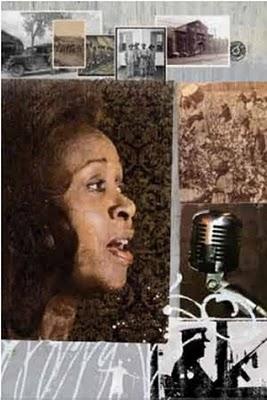Black Pearl Sings! (6/18/2010)

With their current production, Black Pearl Sings!, InterAct Theatre brings a powerful story to the Mainstage of Philadelphia’s Adrienne. The intimate performance space, where third row is a mere six feet from the floor-level stage, helps one feel immersed in the story.
Written by Frank Higgins and directed by Seth Rozin, the two-act play stars C. Kelly Wright as Alberta “Pearl” Johnson and Catharine K. Slusar as Susannah Mullally. In the story, set during the Great Depression, song collector Mullally meets Johnson while visiting a Texas prison. Mullally hopes to find an old song that has never been documented, a song that might land her a university teaching job. She helps to obtain parole for Johnson, with the condition that Johnson will be in Mullally’s custody. After parole, the women go to New York, where they present a performance meant to make both of them famous. The play ends with a powerfully triumphant Johnson in control of her own future, and Mullally humbled and grown through this relationship.
The play is based upon the true story of musicologist John Lomax, who collected songs for the Library of Congress during the 1930s. In a Louisiana penitentiary, Lomax met guitar player Huddie Ledbetter, later known as Lead Belly.
During the course of the play, Mullally reveals that her wealthy family has disowned her for pursuing a nontraditional path (“Why would I want to get married?”), and that a man used her research to advance his career. I sat shaking my head in disbelief, thinking to myself, “So now you are going to use a woman to advance your career? At one point she asks, “We’re friends, aren’t we?” to which Johnson replies, “We’re friendly.” For how can there be true friendship when one party’s freedom is dependent on another’s exploitation?
There were many moments when I found myself embarrassed for Mullally, as well as the ignorance of the community in which she moved, which viewed Johnson as a discovery or exhibit. In Act II, Mullally reads a review in which Johnson is referred to by the writer as “Black Pearl.” Johnson responds indignantly, “How come you ain’t White Susannah?” Mullally was schooled through her relationship with Johnson, and at many times humor eased the way.
For me, the greatest beauty of this show lay in the voice of C. Kelly Wright as she sang a cappella spirituals and folk songs, and her visceral expression of emotions throughout the performance. Her rich voice brought tears to my eyes multiple times, and manifested great power and strength. I felt her voice not only in my ears but in my bones.